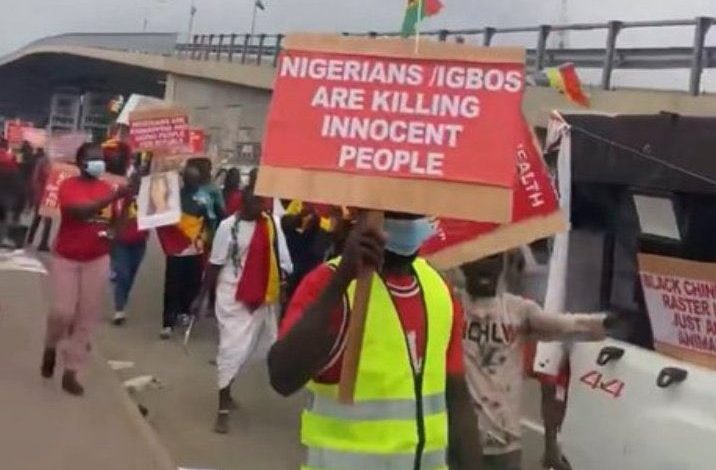
Large-scale protests have erupted in Ghana, with demonstrators calling for the deportation of Nigerians over alleged crimes, including robbery, prostitution, kidnapping, and ritual killings.
Viral videos circulating on social media showed protesters chanting anti-Nigerian slogans and holding placards with messages such as: “Armed robbery and violent attacks must stop”, “Our health at stake due to mass prostitution”, and “Our kids are getting missing because of Igbos”.
In one of the videos, a visually impaired protester appealed to President John Mahama to fulfil his “Ghana First” pledge, while others displayed the image of a man reportedly killed by a Nigerian in Accra.
Another protester claimed, “Our children can’t go out and come back. You can’t come home at night,” linking the insecurity to Nigerian migrants.
The protests have rekindled historical grievances, including Nigeria’s expulsion of over two million undocumented immigrants, mostly Ghanaians, in 1983, following economic strain and allegations of rising crime. The expulsion popularised the term “Ghana Must Go”.
However, Ghana had earlier enacted a similar expulsion policy. In 1969, under Prime Minister Kofi Abrefa Busia, the “Ghana Aliens Compliance Order” forced out nearly three million migrants, mainly Nigerians.
Despite both countries being members of the Economic Community of West African States (ECOWAS), which guarantees the right of residence and work, public sentiment in Ghana continues to build against Nigerian immigrants.
Reacting to the development, the Nigerian government called for calm. Abike Dabiri-Erewa, chairperson of the Nigerians in Diaspora Commission (NIDCOM), condemned the protests and defended Nigerians living in Ghana.
“Nigerians are not criminals. They are good ambassadors wherever they find themselves. Ghana and Nigeria are like Siamese twins… they should continue to live in peace,” she said in a statement issued on Tuesday, July 29.
She advised Nigerians in Ghana to remain peaceful and avoid any form of provocation, noting that the matter is being handled through diplomatic channels by Bianca Ojukwu, the minister of state for foreign affairs.
